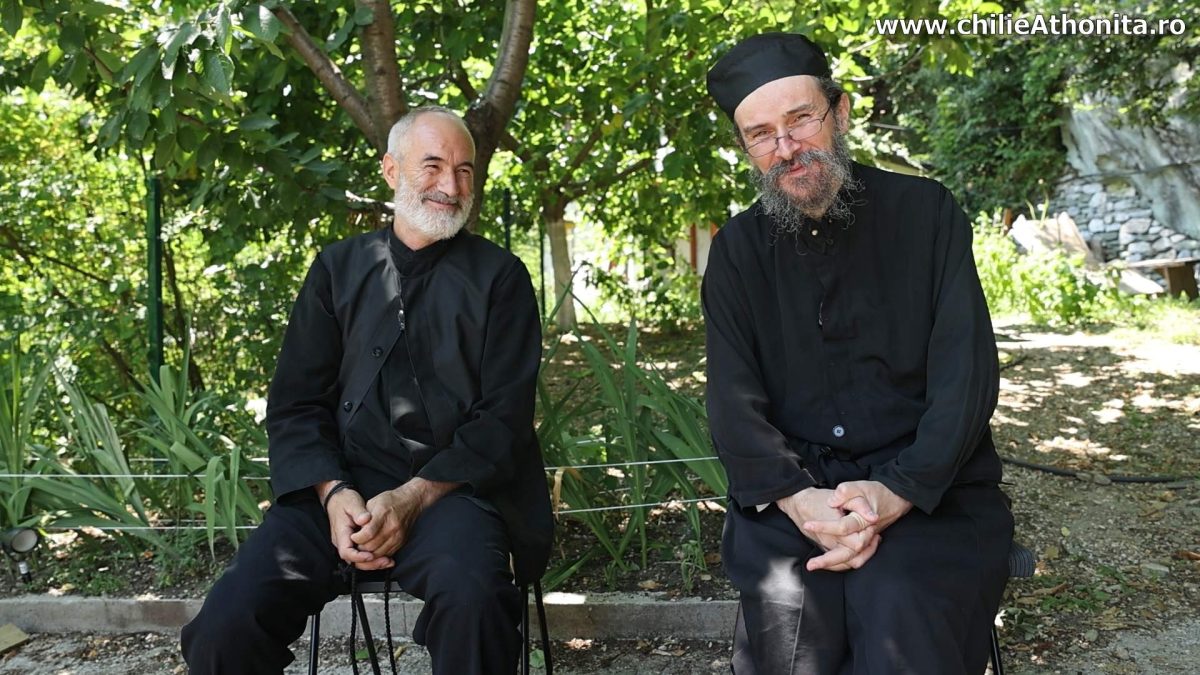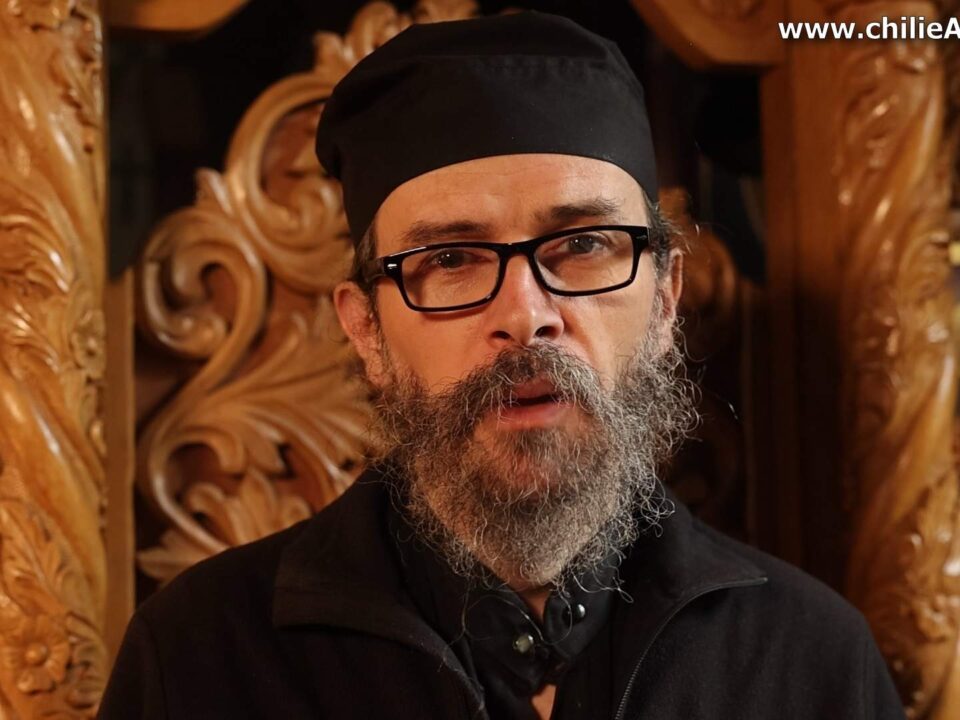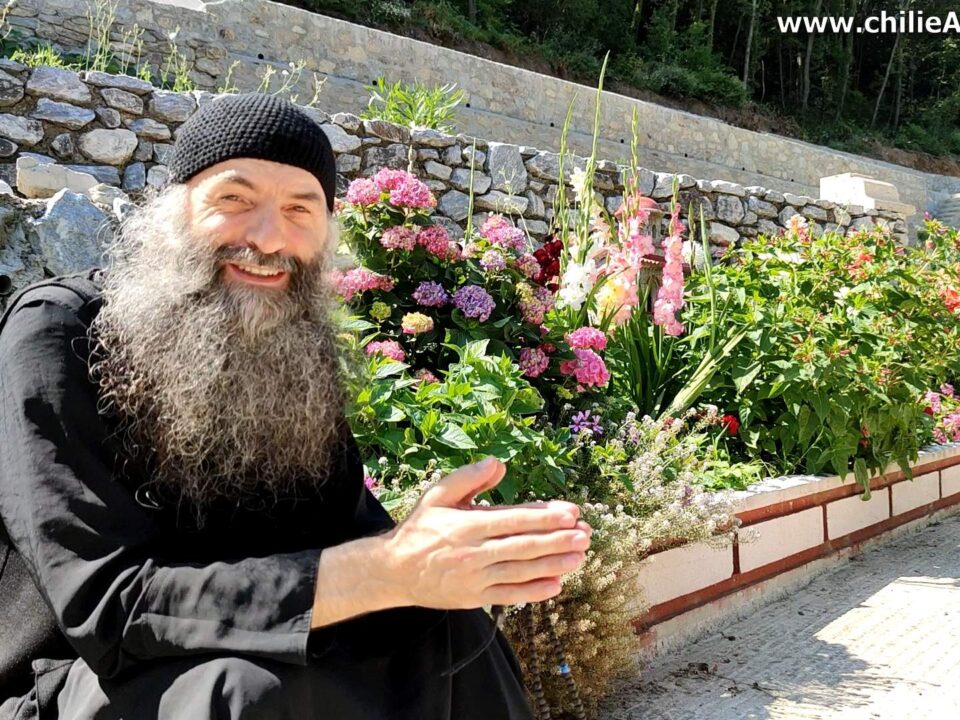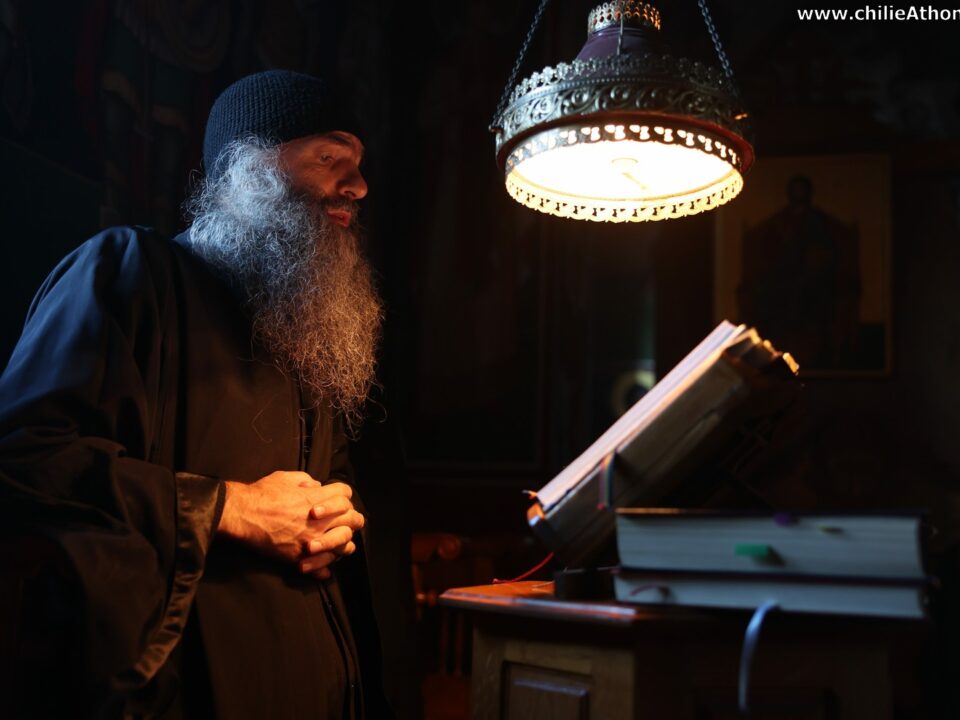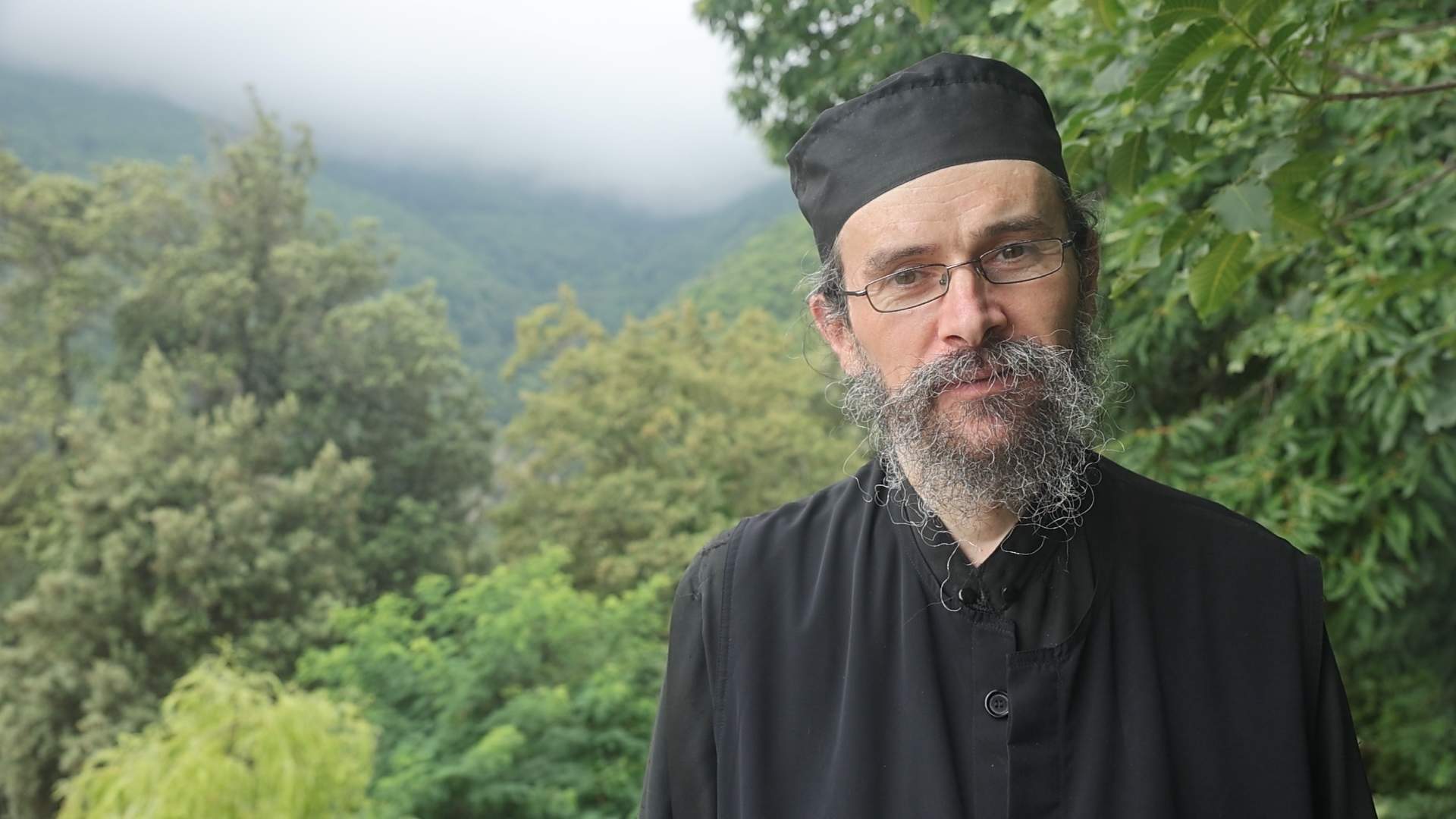
On Dreams, Imaginations and Drugs – Father Theologos
19 July 2022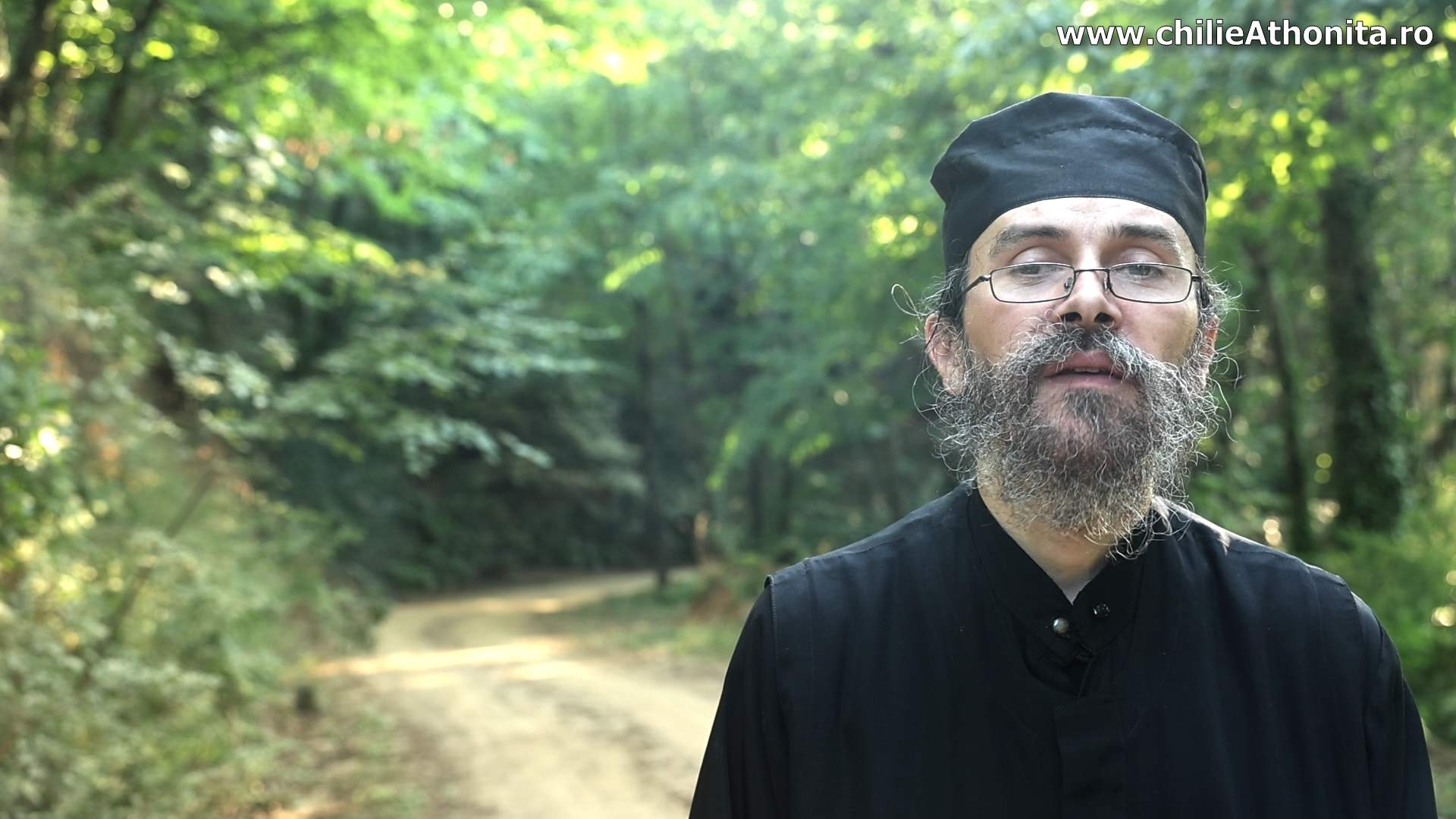
The Love of the Body, Transhumanism, Suicide – Father Theologos
2 August 2022Watch a discussion with Gheorghe Axinte, who, in our opinion, is one of the richest people in Romania.
By watching the clip, you will learn how he came to own what we consider one of the most valuable properties in Romania, as well as his experiences as its owner.
Enjoy!
For the prayers of the Saints of our Fathers, Lord Jesus Christ, the Son of God, have mercy on us. Amen
A wealthy Romanian
Father Theologos: Our dear ones, I am with Gheorghe who is a Romanian by profession. An extraordinary man. He said he is a very simple man. I love him very much and due to the fact that I love him very much I do not agree with him, but let’s not talk because he told me not to talk about… and I’m not going to want to talk about it.
One thing I tell you: in my opinion, I consider that Gheorghe is one of the richest people in Romania and this is not because he has a lot of money – because I am not interested in the financial part as a monk, but (because he has in his possession an extraordinary thing, of very great value, because value is the possibility to get closer to God. Anything that draws us closer to God or any idea that draws us closer to God is an idea of value, a thing of value.
And what he has very valuable, one of the most valuable things in Romania is a prison. It’s about the prison in Pitesti.
Tell us a little bit, tell us a little bit about how it was, how you reached, how did you figure out what was going on there?
Gheorghe Axinte: Yes, it must be said that today is the Pitesti Prison Memorial…
Father Theologos: That’s right, yes.
Gheorghe Axinte: It is no longer the Pitesti prison that was known. Now the prison has moved to Colibași for many years. I think that the good God so ordained many years ago to arrive…
Father Theologos: To get in your possession…
Gheorghe Axinte: Yes, to be there in prison and to buy for the first time shares in a company that owned the prison building. It’s been a long time since then, it was 1999. And those from the company that owned… they have this building of the former prison they asked me if I don’t want to work with them, if I don’t want to come and do a job together and that’s where it all started.
A place that has been discovered
Father Theologos: You knew what happened in Pitesti prison during communism, with the great saints who were there and…
Gheorghe Axinte: Unfortunately, I can say that after years of sitting in the offices inside the former prison currently the Pitesti Prison Memorial, I did not know.
I didn’t know and I didn’t realize what was there until all the former inmates came, the ones who were in communist prisons, and they would come year after year and do a commemoration there and I saw the courtyard full of people.
The former director said to me, “we only allow them at certain times, only in certain places.”
“What do we do? Who are they?”
“Well, they are those who have been through prisons, they have also stayed here in prison because here was prison. Let them in everywhere if they want to, we let them.”
You realize there were offices there. People were at work. Now, let each enter with his memory, each with his own thoughts, each with his own prayer. But then it was the first contact with what the communist prison was.
The second moment I experienced was at Diaconesti. I was going to Diaconesti and one evening, Father Moses was waiting for us there with the nuns, with Father Amfilochie, with Mother Evloghia and I say: “George, you made the chapel, the little church in prison you did it in room 4 hospital.”
And then I said, “Yes, that’s right. It’s in room 4 hospital.” But I thought there was a hospital there, by no means anything else. I mean, that’s where people were repaired. You go to the doctor and the confessor… At the confessor you go to fix yourself spiritually and to the doctor you go to repair yourself bodily.
And they said, “Yes, then we fix the body, now we fix the soul.”
And it was like that when the Apostle Cleopas went to Emmaus and said, “We did not have our heart…”
Father Theologos: Burning
Gheorghe Axinte: Burning. So. At 3 a.m. I realized that that chapel, that little church, is being built in room 4 hospital where there has never been a hospital.
Father Theologos: Yes…
Gheorghe Axinte: Where there was the sacrifice of those who…
Father Theologos: Martyrdom
Gheorghe Axinte: Martyrdom, yes
A special day and many memories
Father Theologos: And especially since today, without us preparing, is the very day when Constantin Oprișan, one of the great martyrs, passed away…
Gheorghe Axinte: Yes. Mr. Marcel Petrișor, he never allowed us to call him a gentleman. “I’m Marcel, right?” And I used to call him Uncle Marcel. He used to call me “master.”
Father Theologos: Really? How beautiful…
Gheorghe Axinte: “Master, where are you? What are you doing?” I had several moments, I also came to the Holy Mountain with Marcel Petrișor and the others, more of them. Maybe we’ll have time to talk about what we’ve done with them in the Holy Mountain. Yes.
I said that they stayed with Costică – that’s how they called him – Costică Oprișan, in the same cell of 4 square meters in that – in fact, they did not call it a tomb, they called it a grave. Because you know what was there at Jilava.
Father Theologos: Effectively, they let them die.
Prison and… Poetry
Gheorghe Axinte: Yes… They said that Father Ghiță Calciu, whom Marcel called Ghiță, could not memorize from “Luceafărul”… – he compared it a little with Eminescu’s “Luceafărul” – only half of the poetry that Constantin Oprișan wrote.
Father Theologos: That long, long poem…
Gheorghe Axinte: That fabulous poem, yes… And look what man we lost and how he was rewarded for what he was.
Father Theologos: Yes, yes. He was a genius and they tried to be destroyed, but you can see that the power of his genius and his holiness prevailed.
Gheorghe Axinte: You have here in the Holy Mountain on… We don’t give his name, right? That if they find out we…
Father Theologos: No, why? It’s about Father Rafail. Let me give the name.
Gheorghe Axinte: He is like a book of poetry, you meet him and after he knows you a little… At first, “Do you want me to tell you a poem?” And it starts, and it starts…
Father Theologos: How beautiful!
Gheorghe Axinte: And it doesn’t end.
Father Theologos: Yes, but see? Extraordinary! Because, in prison, how this need for poetry, for delicacy, for beauty felt. While a man far from the grace of God continually thunders and flashes of injustice, screams… Whereas the others how delicate they are, how holy they are, how they are…!
Gheorghe Axinte: Well, I can say that Mr. Demostene has been at our house many times and we are such friends, even friends, yes… He wanted to get to the solitary to create.
Father Theologos: Glory to God!
Gheorghe Axinte: So you realize it! That solitary where it was cold, where they didn’t give you food for three days, where there was no water, no heat, no sleep. He was creating there.
Father Theologos: Phenomenal! Think about it, what a support of grace! Because we today, if someone looks at us squeamishly, we say that that guy has something with me, that I don’t know what, that who he thinks he is and so on. A little observation from someone and we all get upset. While they under so many torments and in such unsanitary, terrible conditions, they were creating poems! How beautiful!
Gheorghe Axinte: Beautiful! He told me that he met a great poet of Romania, I miss his name now, but I will remember him maybe and I will tell you, he met him talking to him through Morse code or the mug.
Father Theologos: The mug, yes.
Gheorghe Axinte: I don’t know if we know how to talk with the mug through the wall, but… we’re going to develop sometime maybe. And he met this great poet of Romania who is called Nichifor Crainic.
And he said, “How? Are you here? I who have divinized your poetry, have devoured your poems!”
He didn’t know, he hadn’t started poetry at the time. And look, he has some beautiful volumes of poetry.
Today’s survivors
Father Theologos: Yes. Glory to God! What people? Is anyone else living out of them?
Gheorghe Axinte: Only Demosthenes lives. It’s in Bucharest. Mr. Vasile Iamandi…
Father Theologos: Tell us about it!
Gheorghe Axinte: Mr. Vasile Iamandi who is a troubadour like this, an immortal.
Father Theologos: An immortal. Yes, yes.
Gheorghe Axinte: As Răzvan Codrescu wrote: Jacques the immortal.
Father Theologos: It’s a book brothers, phenomenal! “Jacques the Immortal”. Let’s buy it necessarily!
Gheorghe Axinte: Yes.
Father Theologos: I think he had an impossible life.
Gheorghe Axinte: Yes, I was telling you the other day that he went to death. And he went only to death, and God held him in his arms, did not let him die, and he is still alive. It was in the Holy Mountain. I was with him and Father Nicoale Bordasiu in Jerusalem.
Father Theologos: Glory to God!
Gheorghe Axinte: I stayed with them at Saint Sava, in the monastery. I think two days. It was extraordinary. Yes.
Father Theologos: You see these people’s desire for God, for beauty, for delicacy. I mean, they’re not so interested in I don’t know what, in revenge and so on, no.
Gheorghe Axinte: Well, you know it’s the book “Don’t Avenge Us.”
Father Theologos: Yes, yes, yes.
Gheorghe Axinte: With those who were deported from Bessarabia and even so they say: Do not avenge us! You see, they stayed in prison and after that, when they got out of prison – Marcel Petrișor and Demostene Andronescu – they go to visit Craciun, their former unit commander, so to speak, in prison.
Father Theologos: Responsible torturer.
Gheorghe Axinte: Yes.
Father Theologos: The executioner…
Gheorghe Axinte: The executioner of the executioners. Yes. And he says to him – Mr. Demosthenes tells the story very nicely, he says, “I got to him at the door, he was sitting in a studio apartment We knocked on the door and a man came out in front of the door and we didn’t see that Craciun we knew from jail. It was another Craciun.”
And he says, “I took pity on him and embraced him.”
Father Theologos: The poor man. Glory to God! Yes. Cool.
Gheorghe Axinte: With all the strength and with all the love. Marcel says, “Only Demosthenes is capable of such a thing!”
Father Theologos: See how powerful man is in Christ! Love, yes. How powerful it is! I mean, it’s phenomenal. Overcome all. Yes.
I understand that Demosthenes, I think the nuns from Paltinu take care of him, I heard news now recently.
Gheorghe Axinte: I really don’t know anything. I promise when I get home, I call him!
Father Theologos: Yes, yes.
Gheorghe Axinte: I call him and ask him what he does – both him and uncle Vasile Iamandi. The immortal.
Father Theologos: Iamandi, yes.
Gheorghe Axinte: Marcel said that he was a French speaker, he had a house in Paris. He said that he had read a book by Le Pen and in the second volume wrote about a Romanian. They were in the foreign legion, Mr. Le Pen was the chief… how were they there, I don’t know…
Father Theologos: Commander.
A Romanian ready to die
Gheorghe Axinte: Commander, yes. And he said: there was a Romanian who whenever someone was hired to carry out a mission to the impossible, that is, to go to death, this Romanian – he did not know his name – went there, he was the first.
Father Theologos: Vasile Iamandi.
Gheorghe Axinte: Vasile Iamandi, yes.
Father Theologos: Glory to God! And today we are somehow afraid of catching a cold, of getting infected and the man in every suicide mission and he was I believe on all the battle fronts in Cambodia, in Vietnam…
Gheorghe Axinte: Yes, well, he took it from Cambodia up to Moscow, they walked when on foot, when on the train, when on the donkey, when one behind the other.
Father Theologos: And I understand that only about 10 of the thousands of …
Gheorghe Axinte: Yes, he says they were… He writes in his book, “Jacques the Immortal.” He always tells more like asking: Mr. Iamandi, tell us how it was in Moscow? That after two months or half a year or a year as long as this whole trip lasted, they get to Moscow. And they finally got to a bathroom, until then they had not seen water.
He said that the boots were broken in his legs and he had the skin on the sole was what it was like, if you know – the older ones probably know what it’s like at the neck of the ox, at the yoke. He says, that’s how the skin on our feet was.
Father Theologos: Lord! Glory to God!
Gheorghe Axinte: Tanned. And he says that after they washed them, after they organized a feast for them, they woke up in the middle of the night with some machine gunners who…
Father Theologos: Really?
Gheorghe Axinte: Yes.
Father Theologos: To kill them.
Gheorghe Axinte: yes. A lot of them died, some of them escaped. He says that then a Moldovan who until then said that he spoke only Russian and then he found out that he was Moldovan and wrote: do not shoot!
Father Theologos: Glory to God!
Gheorghe Axinte: And… finally, I don’t know how many of them died. Then they sent them to Romania and got sent to solitary.
Past and present
Father Theologos: Phenomenal. And think about what lives these people have and what immense patience they have done and what courage they have had today as I said we are pampers generation, because, we are so weak!
Gheorghe Axinte: Well, but we use pampers, right?
Father Theologos: Yes, exactly, we use pampers and it also changes our way of thinking. Mother of God! Glory to God!
So now, in the former prison of Pitesti there is a chapel there, a small church.
Gheorghe Axinte: Yes.
Father Theologos: And does anyone serve or how?
Gheorghe Axinte: Yes, we have a chapel right in room 4 hospital. It belongs to the Pitesti Prison Memorial. It’s service every day of celebration. It happens that today we celebrate our patron: Saint Ioannikios the New from Muscel.
Father Theologos: Glory to God! Things cannot be accidental. There’s no way.
Gheorghe Axinte: Well, we have two landmarks today, right?
Father Theologos: Yes, yes, yes, yes, well that’s what I’m saying! And Saint Ioannikios and Constantin Oprişan.
Gheorghe Axinte: You could say St. Constantine Oprişan.
Father Theologos: St. Constantine Oprișan, of course, you said it yourself and I wanted to say it. Glory to God!
Do we see how the saints are? So these are such very small and very cute and very beautiful wonders.
Other wonders and other such signs of grace, from your experience… of the master there, can you tell us? Something..
Wonders
Gheorghe Axinte: Well, we can start with the first miracle. The first miracle would be that I bought the prison in 99.
Father Theologos: Yes, yes.
Gheorghe Axinte: It was without money in my pocket.
Father Theologos: Really? You see they’re recording you on camera, man! Yes…
Gheorghe Axinte: I can say the same thing next time.
Father Theologos: Yes.
Gheorghe Axinte: The people from the company called me and asked me if I’m keeping my word. And I said yes, but I didn’t know what word.
Father Theologos: Yes, good, yes. Glory to God! I trust you. To trust George, to know!
Gheorghe Axinte: And I started so timidly and eventually it materialized. And that was the first wonder that I didn’t have the money and I bought a company that was at the time quite well rated, with about 800 employees. They weren’t a few. By then I hadn’t managed more than 10 people.
Father Theologos: Glory to God!
Gheorghe Axinte: I didn’t know what it was like to have directors, to have secretaries, to have a car, to have everything…
Father Theologos: Yes, structures…
An unsuccessful demolition
Gheorghe Axinte: Structures, yes. But that’s the way it was, that’s how it happened. The second wonder: I got an approval from the city hall to demolish. We got a demolition permit.
Father Theologos: Of the prison?
Gheorghe Axinte: Yes.
Father Theologos: Really?
Father Theologos: Yes, yes…
Father Theologos: Mother of God!
Gheorghe Axinte: And I started to demolish, as an owner, as a boss.
Father Theologos: Yes, yes. As a boss.
Gheorghe Axinte: As a boss, yes. What does a boss not do?
Father Theologos: He can do anything.
Gheorghe Axinte: Marcel – “Master, what are you doing? You’re demolishing the jail!”
I didn’t know them at the time. And it started from the fence, with all the appendages. I had demolished the bottom side a few years before. Now we’re building a church down there.
Now we’re also demolishing the front, here. And we demolished it up to the jail. It is seen that the tile still remained on the wall. There are, I think there were bathrooms there, I don’t know… And it the job wasn’t moving, the work didn’t move at all, it didn’t move forward. In two days they demolished everything and after two days nothing worked.
“Well, what are you doing there? Aren’t you finishing with the work? What?”
“Yes… we are demolishing.”
“Okay, come on, let’s finish faster that we have to build the new era, one of money.”
And nothing happened, but nothing happened.
Father Theologos: Really?
Gheorghe Axinte: And it stayed that way, testimony…
Father Theologos: Tile…
Gheorghe Axinte: That wall, the tile, everything demolished up there and the wall…
Father Theologos: Glory to God! And all this in two days and from there on nothing!
Gheorghe Axinte: Nothing! No growth! That is, the step on the spot.
Father Theologos: Glory to God! Incredible!
Gheorghe Axinte: The Father was telling, yes, being 2 to 3 weeks since I stayed at their hermitage, there is a church near Thessaloniki that bypasses the street.
Father Theologos: Yes, yes, yes
Gheorghe Axinte: The demolition company came to demolish. And the abbot said: You have no blessing! And they put the excavator on the roof and it didn’t demolish it.
Father Theologos: Yes!
Gheorghe Axinte: They didn’t succeed.
Gheorghe Axinte: In Piteşti.
Father Theologos: Same! Glory to God! How beautiful! How beautiful!
Yes and I think beyond these miracles, yet there is a very intense grace there and people think they change the moment they come. Do people come to visit? Do they change?
Gheorghe Axinte: People come to visit. It’s a visiting program at the Memorial, but people come to pray at the Chapel. They come.
Father Theologos: Yes, yes.
Gheorghe Axinte: We have the Holy Mass every Wednesday from 6 o’clock, we have a service every morning on the celebration days, we do twice a year, before the Holy Apostles Peter and Paul, 40 uninterrupted Divine Liturgies. Every day.
Father Theologos: Every day. Glory to God!
Gheorghe Axinte: And before the Birth of the Savior, the same thing.
Father Theologos: How beautiful!
Gheorghe Axinte: And the people are coming.
Father Theologos: So, so it’s a spiritual monument, not a historical one, as I said, obviously.
Gheorghe Axinte: Yes, we can say that it is also a historic moment, that there is our history, we cannot deny it.
Father Theologos: Yes! Obvious. But first of all, it’s about spirituality.
Gheorghe Axinte: Yes.
Father Theologos: That’s why I said you’re the richest, because spirituality interests me.
Gheorghe Axinte: Yes, people are coming and you know that we have people who have settled here, that is, they come with all the love at all the services, at all the activities that are done.
Father Theologos: Glory to God! They are the people from there, they have become the people of the prison, the memorial…
Gheorghe Axinte: Those… our prayer colleagues. Our pilgrims, if you will…
Prison today
Father Theologos: How beautiful! Extraordinary. Yes, how many rooms are available for visit, everywhere or how?
Gheorghe Axinte: Well, here we have…. This prison was divided into several companies after 1990 when everything was divided through MEBO (Management Employee Buyouts) and there are several companies. We have one side of the building and there are other companies that have the other side. Yes, what’s with us everything is opened for visit. We have the basement, we have the ground floor, we have the 1st floor, we have the entrance where the commanders were.
Regarding the commanders, Father Ioannikios from Frăsinei, the abbot first came, came out of the Holy Mountain and so it happened that I came with his holiness and waited for him at jail. And that’s how he pointed the finger: this is where I spent the first seven days of my prison. Of which the first four without water and food.
Father Theologos: Glory to God!
Gheorghe Axinte: So somehow here was the commemoration part and it can be visited. There’s a schedule, some stages are included in the schedule…
Father Theologos: Yes, yes, places that..
Gheorghe Axinte: Yes, it’s a guide that explains, says what was there.
Father Theologos: Glory to God!
Gheorghe Axinte: In the next days starts the summer school.
Father Theologos: Oh, do you have school there?
Gheorghe Axinte: Yes, it started with summer school I think after 2010, 2011, I don’t know exactly. Mary knows best. She is the amphitrion, the commander of every day, yes.
Father Theologos: On appeal to the scene… Yes…
Gheorghe Axinte: When was asked on the phone: where are you?
At the prison.
A! Well.
The Spirit of the Saints
Father Theologos: Glory to God! What I wanted to say: the spirit of the saints exists there, the spirit of those who have gone, that is, it is felt, for example… Do you understand what I mean?
Gheorghe Axinte: I can tell you that before we made the chapel we had arranged such icons around the room, that I did not know what was here – as I told you – and I said that this is the largest room in the whole building, come on, let’s make a chapel here. And we had two iconostasis and he was living at that time, the engineer doctor who was in room 4 hospital, Constantin Iulian.
Which, I don’t know if you know, he created the sea lock at Agigea, he designed it, yes.
Father Theologos: No, I didn’t know.
Gheorghe Axinte: When he entered room 4 of the hospital he stopped at the door and remained a little marked by what impact the spirit had in his soul. But leaving here, after we did the chapel, after we started the services, the Divine Liturgy. At night at 3 there was a Divine Liturgy at night. Saturday morning with the commemoration of those who passed away here in…And I could just feel from below I could see and feel the traces of blood.
Father Theologos: Glory to God!
Gheorghe Axinte: On the cobblestones. Because we haven’t changed anything here. As we found, that’s how it stayed. The first time I put on a carpet and I took it out…. We consulted with the nuns from Diaconești, with some fathers from the Vatoped Monastery and that’s what we felt.
We feel it now, it feels even now. I remember that I was at a Divine Liturgy, a father here from the Holy Mountain was servicing, a lot of people, in the summer as now. At best it had to be a smell of…
Father Theologos: Yes, yes, not very…
Gheorghe Axinte: Yes, not very… And there was a smell of good fragrance and next to me was a friend. And I motioned for him. He says, “yes, yes, yes, of incense!”
Father Theologos: Glory to God!
Gheorghe Axinte: But no one was incense in the chapel, in the church and that’s when we realized that it was a smell of good fragrance…
Father Theologos: Of holiness… Holiness exists.
Gheorghe Axinte: Holiness exists.
Father Theologos: Any relics have been found?
Gheorghe Axinte: We in Pitesti did not find anything, but instead we have, the good God has ordained, we even have the relics of Saint Ioanichie the New from Muscel. Today celebrated.
Father Theologos: Glory to God!
Gheorghe Axinte: Yes.
Father Theologos: The Saint is outrageously caring for you. May the Saint help us!
Gheorghe Axinte: Amen, amen amen
Father Theologos: And I think of Constantin Oprișan now that we celebrate today. Although it would be interesting to find. Where would his relics be?
Gheorghe Axinte: Well, we’re talking about Jilava. Now in that place the Garden of peaches or something like that I know it was called… now, when the saint wants to show himself.
Martyrs and contemporary survivors
Father Theologos: Let it be shown… But I see that the saints want, and I see that there is this continuous oppression on the part of the saints to come out to the appearing, to enter into the consciousness of the people, to disappear all this misinformation, all these things that people do not know about them. And little by little I think that, I see that their grace helps a lot towards the upliftment of the nation. That is, people are slowly imbued with their way of thinking, with their spirit, with their nobility.
And I think that the moment the last of them dies, I don’t even know who he’s going to be, I think Mr. Iamandi….
Gheorghe Axinte: Well, we have our father here…
Father Theologos: Yes…
Gheorghe Axinte: We have Mr. Iamandi, from what I know, Mr. Demostene Andronescu, Gabriel Buzu who is a monk – he was a roommate of the father.
Father Theologos: Yes? With Father Rafail?
Gheorghe Axinte: Father Rafail, yes.
Father Theologos: So we don’t do with Father Rafail that he doesn’t want to. That’s one of my great sadness, that he doesn’t want to. Mr. Gabriel would like to do something, to say…?
Gheorghe Axinte: We go to Romania and we go to him.
Father Theologos: Yes, yes. Exactly.
Gheorghe Axinte: I don’t think it’s a problem. A very voluble parent like that, I’ve been to him.
Father Theologos: May God help him!
Gheorghe Axinte: I found out about him from Father Rafail… but wonder – I have a very good friend who is a cousin of Father Gabriel from Father Paisie from below and he tells me: tomorrow, the next day of Christmas I will be with Father Gabriel.
Father Theologos: Hmmm
Gheorghe Axinte: Are you coming? It was the second day of Christmas I got in the car and went to Maramureș.
Father Theologos: Glory to God!
Gheorghe Axinte: I ran up there, I stayed at the Divine Liturgy, I met the father closely and I went back home.
Father Theologos: Glory to God! It’s worth it.
Gheorghe Axinte: It’s worth it. There is also Mrs. Galina Răduleanu.
Father Theologos: yes. Mrs. psychologist, right? Which is extraordinary.
Gheorghe Axinte: Yes. Mrs. Galina Răduleanu, doctor psychologist. her father, Boris Răduleanu, a priest from Bessarabia. They were the whole family arrested, except for the mother.
Father Theologos: God forbid! What dramas!
Gheorghe Axinte: She tells how they came and arrested her from work, from work where she was there, in a village somewhere…
Father Theologos: Oh my God!… How many values! How many values! And today we invent that we no longer have values. We improvise.
Document Movies
Gheorghe Axinte: Unfortunately it is like that. I didn’t know him, I only knew Ciabua Amiredjibi from the movie. He was Marcel Petrișor’s friend. He was a Georgian prince. I was coming with Father Mark, father Mark’s boy from Focsani. Not Mark the Fachir. And I called Marcel and I asked him, Mr. Marcel, what was your friend’s name that I had forgotten? That we want to see his film on the internet.
And Marcel says, well, why master? He died yesterday. He will get buried on Tuesday.
I wanted to see the movie… And I went to his funeral. But what do I mean. I was at university and I was teaching students about business, I think, I don’t know how good I was at business, but I was telling them something there. And once, I say, come on, let me put you a movie!
And I remember putting Ciabua Amiredjibi on it. At first everyone was on the phone, they had work, cutting their nails or I don’t know what else they were doing there. The first sequences are very tough and the students left everything and watched until the end.
Father Theologos: Glory to God!
Gheorghe Axinte: Because they saw a hero, a landmark.
Father Theologos: An example.
Gheorghe Axinte: An example. Of course, from here we could also take the example of the Georgians and these people that we have left two or three more to try to do something …
Father Theologos: To film…
Gheorghe Axinte: Yes…
Father Theologos: Or make a film about the Saints in prisons. Could it be filmed there at you guys?
Gheorghe Axinte: Sure, but it was already filmed.
Father Theologos: Yes?
Gheorghe Axinte: Yes, yes.
Father Theologos: Glory to God! Who? Andrei Negoiţă, right or?
Gheorghe Axinte: Andrei Negoiţă came to us, made a film about Father Ghiță Calciu, documentary, but he did not shoot in Pitesti, I do not think he filmed in Pitesti. We don’t know. Instead, Maria filmed. He did something else. It was just last year a film on TVR 2, if I’m not mistaken, a film about Pitesti. Some students from Cluj.
Father Theologos: Artistic?
Gheorghe Axinte: An artistic film, yes, to the documentary.
Father Theologos: Docu-drama.
Gheorghe Axinte: Now not everyone likes it, you know… We can’t…
Father Theologos: Yes, yes, but I think that a well-made feature film like Mr. Mărgineanu did – Blessed you are prison – but even more so with the Romanian saints known in prisons, I think it would catch on very well.
Gheorghe Axinte: It was made last year, I can say that I made with Father Mega Ciprian in Oradea, a film about Saint Ghiță Calciu.
Father Theologos: Yes, yes, yes
Gheorghe Axinte: But filmed in Oradea.
Father Theologos: And when is it going to come out? How did it come out, what’s it like? I don’t know.
Gheorghe Axinte: Now he goes to festivals, something like that, yes. It’s kind of finished and it’s taking its course.
Father Theologos: Glory to God!
Gheorghe Axinte: I don’t know because I didn’t deal with it.
Father Theologos: Yes, you only dealt with the help part.
Gheorghe Axinte: Yes, I don’t know what I did.
Father Theologos: Let the good God help! I think we need like air of this authentically Christian culture that in prisons has been in poems… Unfortunately, today, it’s a great pain on my part that poems are no longer at the consideration, at the appreciation to which they should be. Today, unfortunately, people are on movies and I think yes, we could make films and we could promote these, beyond books. These great, great people to imbue ourselves with their way of thinking, their way of being, to have them as examples. Because at this point I think there’s an acute lack of examples.
Gheorghe Axinte: We have them all over the place.
Father Theologos: Yes!
Gheorghe Axinte: We just have to see them!
Father Theologos: We just have to see them! Yes.
Gheorghe Axinte: That’s it, we don’t need anything else. Let’s lean on that for a moment.
Father Theologos: Yes. Let the good God help! Thank you very much, Gheorghe. A natural dialogue For the prayers of the Saints of our Fathers, Lord Jesus Christ, the Son of God, have mercy on us. Amen
Let’s not forget the examples!
Gheorghe Axinte: It wasn’t really hard.
Father Theologos: It wasn’t, right?
Gheorghe Axinte: Now, you will see your holiness when you scroll there what you find…
Father Theologos: Yes, yes, but I think it was very good and very natural it was.
Gheorghe Axinte: Yes?
Father Theologos: Yes, very nice. It was honest.
Gheorghe Axinte: I came a little tired that I had obedience: Kareya – The Great Lavra – coming back on these roads…
Father Theologos: Oh, Mother of God!
Gheorghe Axinte: And it got me…
Father Theologos: exhausted.
Gheorghe Axinte: I say, now, I don’t know how I’m going to do it but…
Father Theologos: The grace of the saints helped you, they helped you…
Gheorghe Axinte: Yes, yes. Thank God!
Father Theologos: Thank God!
Online commemoration lists and donations
May the Lord help us!
Online Commemoration Lists and Donations
May the Lord help us!
If you have a bank card and wish to send commemoration lists and donations online using your card, and/or to support our philanthropic activity, including this site, please fill out the form below to make a small donation. The form is secure – we use Stripe for payment processing – a world leader in this field. We do not collect your personal data.
If you do not have a card, or do not wish to use it, visit the webpage for Online Donations and Commemoration Lists.
We will pray for your loved ones! (Please do not include inessential details like wishes, degree of kinship, introductions etc. JUST the name!)
Especially for recurring commemoration lists, we ask that you please keep them to under 20 names long. If you include a member of the family, we add “and for their families.”


